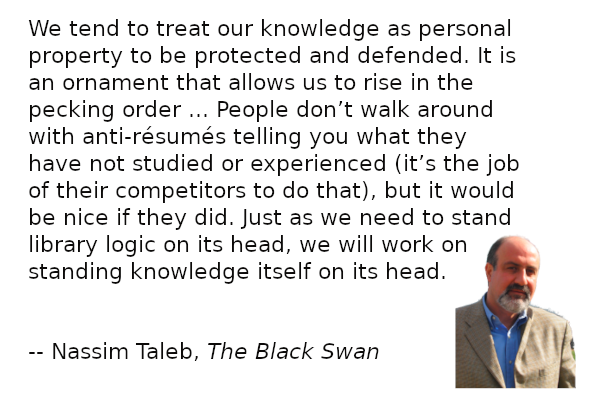Ignorance is not a sin, but stupidity is (or should be)
Personally, I am not a fan of self-help gurus and motivational speakers. Giving people advice is a huge responsibility, which these people seem to take too lightly. Also, if you look closely, it’s not hard to find the impostors among them, like the man giving career advice to people while living in the proverbial van down by the river.
The motivational speaker in this video is a little too honest. Most of them aren’t.
But my problem with them, and other supposed experts in general, is not their lack of skills or experience. It is their tendency to focus exclusively on what they know while neglecting what they don’t know. Ignorance by itself is not a problem, but the deliberate dismissal of it (which is my definition of stupidity) is. The greatest danger, in my opinion is that by ignoring ignorance, experts may lead the layperson to believe that it doesn’t exist. Out of sight, out of mind.
I think that someone treated as an expert should be smart enough to know what they don’t know. If that is the case, they should be held accountable for their deliberate choices. If not, perhaps we should stop treating them as experts.
Who is an “expert” anyway?
One of the most problematic aspects of modern media is our perception of experts. An expert is someone who knows a great deal about a given subject and has the credentials to prove it. On average, their judgements on that particular subject, even if they are little better than educated guesswork, should be far more accurate than those of the layperson. If their credentials are genuine, we can trust what they say, right?

Even assuming that these experts are honest people operating in good faith and of their own free will, this isn’t so straightforward, for a couple of reasons.
Knowing too much can become a problem
Experts are expected to be intellectually sophisticated people who know a lot about certain things but typically lack a “wide range of exact knowledge”, which Sherlock Holmes describes as one of the essential qualities of a good detective. Being laser-focused on one field of knowledge increases depth at the cost of width.
Economists who excel in mathematical modeling may expect people to behave like variables in an equation, failing miserably to explain actual economic behavior. Another economist, not as mathematically inclined but well versed in psychology, would have a better time.
Complex problem-solving in the real world requires both breadth and depth of knowledge. But the nerdification of knowledge has pushed the development of expertise in one direction much more than the other. We believe that specialists who have deep understanding and skill in one domain can extend their abilities to another. But we often dismiss the possibility of a jack-of-all-trades generalist solving a highly specific problem that has puzzled specialists.
The physicist Freeman Dyson used the analogy of birds and frogs to compare generalists and specialists, opining that both are needed and neither is better than the other:
Some mathematicians are birds, others are frogs. Birds fly high in the air and survey broad vistas of mathematics out to the far horizon. They delight in concepts that unify our thinking and bring together diverse problems from different parts of the landscape. Frogs live in the mud below and see only the flowers that grow nearby. They delight in the details of particular objects, and they solve problems one at a time. … It is stupid to claim that birds are better than frogs because they see farther, or that frogs are better than birds because they see deeper. The world of mathematics is both broad and deep, and we need birds and frogs working together to explore it.
His remarks were made in the context of mathematics, but are equally applicable to any field of knowledge. The topic of generalists versus specialists is explored in greater detail in the book Range: Why Generalists Triumph in a Specialized World by David Epstein, who argues that our modern obsession with hyper-specialization should not eclipse the role of generalists.
Not all domains of knowledge can have experts
Our notion of expertise includes an assumption, one so fundamental that it never has to be spelled out: time plus effort equals expertise. The “ten thousand hour rule”, a pop culture oversimplification full of asterisks, expresses this general point: if you spend enough time and effort on learning something, you will eventually become an expert. It turns out that this assumption itself is also an oversimplification.
A tennis player can get really good with practice. An engineer can master the workings of machines with enough study. How about a gambler? Or a financial analyst? Is ten thousand hours of training enough to reliably win a bet or predict the stock market?
The key is feedback. Engineers and tennis players learn in an environement where their actions can be clearly linked to outcomes. This provides consistent high-quality feedback which can be used to improve skills. But the gambler and the financial analyst struggle to draw a clear line between action and outcome, since the relationship is obscured by inherent randomness and incomplete knowledge. The feedback they receive is poor and misleading.
Learning environments can be either kind (experience always improves skill) or wicked (experience worsens skill or has no effect), to use the terms coined by psychologist Robin Hogarth. Wicked environments are difficult to learn from, since experience may provide the wrong lessons. The problem is that conventional thinking fails to recognize wicked environments. We expect all arenas of life to be like classrooms or sports, defined by clear rules, free of ambiguity and rewarding effort and experience. We question experts only on the basis of their credentials, never realizing that many domains of knowledge actively hinder the development of expertise.
